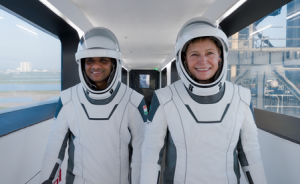Shubhanshu Shukla’s flight to space station likely tomorrow: NASA

New Delhi: After being deferred multiple times, NASA Tuesday announced a new date for Indian astronaut Shubhanshu Shukla’s historic flight to the International Space Station.
Shukla is now slated to fly June 25 from Launch Complex 39A at NASA’s Kennedy Space Center in Florida.
“NASA, Axiom Space, and SpaceX are targeting 2:31 a.m. EDT, Wednesday, June 25, for the launch of the fourth private astronaut mission to the International Space Station, Axiom Mission 4,” NASA shared in its latest update on the social media platform X.
“The crew will travel to the orbiting laboratory on a new SpaceX Dragon spacecraft after launching on the company’s Falcon 9 rocket,” the post added.
The mission had originally been scheduled to lift off May 29 but has since been rescheduled multiple times, first to June 8, then to June 10, June 11, and most recently June 19.
It was last slated to launch June 22 but was again delayed following continued assessments of recent repair work on the Russian Zvezda service module’s aft section aboard the ISS.
“The targeted docking time is approximately 7am Thursday, June 26. NASA will provide more details and its coverage information shortly,” the US space agency said.
The mission holds historic significance for India. Group Captain Shubhanshu Shukla is set to become the first Indian astronaut to visit the International Space Station and only the second Indian in space after Rakesh Sharma’s flight in 1984.
Shukla will serve as the pilot of the mission alongside Commander Peggy Whitson of the US.
The other crew members include Slawosz Uznanski-Wisniewski of Poland and Tibor Kapu of Hungary, both serving as mission specialists. Once aboard the ISS, Shukla will conduct pioneering experiments related to food and space nutrition.
These experiments, developed under a collaboration between ISRO and the Department of Biotechnology (DBT), with support from NASA, aim to enhance understanding of sustainable life-support systems, a crucial aspect of future long-duration space travel.
The research will also study the effects of microgravity and space radiation on edible microalgae — a nutrient-rich, high-potential food source for future space missions.
The experiment will evaluate key growth parameters and examine transcriptomic, proteomic, and metabolomic changes in different algal species in space compared to their behaviour on Earth.
IANS
News